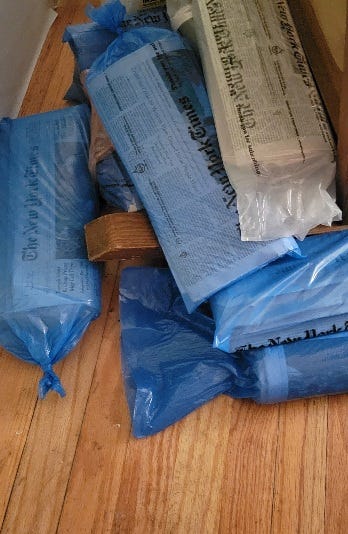A Lonely Existence Indeed
It seems as if every year for the past few years I go off the rails with end-of-year responsibilities, assemblies, and of course, grading. I can usually count backward to the beginning of my annual trip to the brink of insanity by counting the number of unread, untouched New York Times Sunday editions that sit in my living room. This year the number is nine. Nine weeks ago I came unglued. However it is now mid-June and I’m finally free from school madness for a few precious weeks.
One thing I won’t soon forget about the academic year 2024-25 is our district’s implementation of advisory periods at both high schools. The idea had been batted about for well over a decade, but this year the talk finally became a reality. We have an advisory period twice a week. Tuesdays were originally scheduled for character education/improving student-teacher relationships, and Thursdays were to be for SAT prep and academic work. Contrary to what many of my colleagues think, I think intentional time for an advisory period is not a bad plan and can serve the needs of students and teachers if it is planned and implemented appropriately. It was during my final advisory period this year that I was granted a tiny peek into the minds of today's adolescents, and honestly it was a little disconcerting.
At the beginning of the year, when students began to loudly complain about advisory periods, we sat together and talked about how the class could be improved. I wrote down most of what they said. A couple of weeks ago, during our final session for the year, I brought that document back out and we had a conversation about what, if anything, had changed. One of the statements I wrote down had the words “study group” in it. I admitted to my class I didn’t quite remember what they meant when they said “study group.” At that moment, based on how my kiddos looked at me, I apparently sprouted two heads and daffodils.
Class: “What’s a study group?”
Me: “Well you tell me but usually it’s when you get together with people you know and study the same material.”
Class: “That’s just getting together with your friends and you’ll never get any work done.”
Me (confused, but curious): “Ok. What if you wanted to get together and study…say… AP Chemistry with a few people in the class that you didn’t know. Does that happen?”
Class: “Oh…ewww…no.”
Individual student one: “What if you make those arrangements and no one shows up to study? You just end up looking stupid.”
Individual student two: “We just handle that stuff over text. And then a lot of times if you ask for help people will respond and say ‘I dunno. I’m confused, too.’”
Individual student three: “And what if someone you’re studying with gets a better grade than you? Then they’ll set the curve. Oh...just no.”
Doubly confused, I wisely decided to drop that conversation and simply celebrate the end of the year with them. Later that afternoon I told a colleague and friend about the discussion. I was still shocked about the fact that these kids didn’t have any idea what a study group was, and then upon discovering what it was, had zero desire to ever be a part of one. My friend wasn’t as shocked as I was. As a matter of fact, he was just sad. He shook his head and said “this is their life,…can you imagine? What a lonely existence.” Most of those students would never admit to being lonely, but my friend was exactly right. If you or someone you know is wondering whether or not schools are still feeling the impact of Covid-19, you may have just found your answer. Our kids are lonely kids. You don’t grow out of being lonely. In addition, I don’t see a path where they will suddenly change their habits when they are on a college campus, which is too bad because for years researchers have pointed to study groups and visiting professors during office hours as two practices that can improve grade point averages during the first year of college. As for the high school experience, is it possible to begin to reimagine schools as places where students learn to become comfortable with discomfort? Places where the fear of failing and being mocked over social media doesn’t rule the school? Places where students find actual joy, not fleeting moments of happiness which occur when watching others live curated lives on 7” screens? Can educators and parents use our immense talents and good intentions to create a better world for young people? After the final conversation in my 2024-25 advisory period, I think we have to do exactly that…there really is no choice in the matter.





I lived for study groups while in HS - especially for FLEXams and AP Calculus! I distinctly remember going to someone's house, getting out our notebooks, and reviewing material together. And study groups definitely in college. We would reserve rooms! The idea of today's students doing everything by themselves is sad. Thank you for your reflections.
We have an advisory time as well, most of it is spent working on EDP lessons, but there is some time spent doing things together like decorating doors for spirit week, watching videos of workout news by it video production classes, and some miscellaneous things.
I agree with you about our students not knowing how to study and for troubling that is. They funny even know how to take notes properly. The loneliness I partly blame on cell phones, if they are not allowed to use them they are forced to interact with their peers and it truly makes a huge difference.
Enjoy your summer!!! If you're going to be in the area let us know, we'd love to see you!